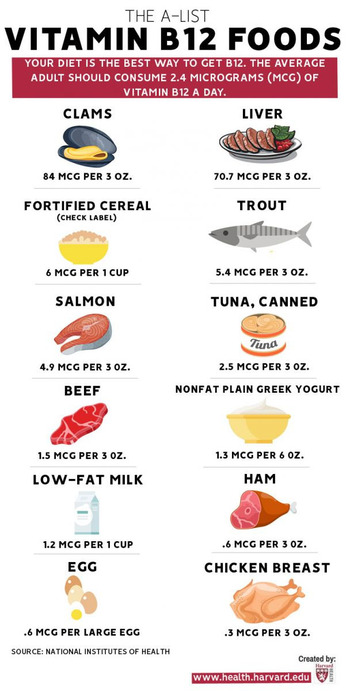:
Vitamin B12, also known as cobalamin, is an essential water-soluble vitamin that plays a crucial role in multiple bodily functions. It is naturally present in various foods derived from animals. It is not found in plants, as plants do not have the ability to produce this vitamin. This vitamin is present in the human body, primarily stored in the liver. Too often we hear about Vitamin B12 deficiency. Understanding its importance is critical to a Healthy Lifestyle.
Vitamin B12 has several critical functions:
- It helps produce red blood cells and prevents anemia. Red blood cells carry oxygen throughout the body.
- It plays a role in DNA synthesis, cell metabolism, and the production of energy from the foods that we consume. Cell metabolism allows cells to divide and grow properly.
- It supports the nervous system. B12 helps maintain the myelin sheath that insulates nerve fibers, facilitating efficient nerve impulse transmission. A deficiency in B12 can lead to neurological disorders.
- It aids in brain function and mood regulation. Cobalamin is a major contributor to helping to prevent depression
- It helps metabolize food and extract energy. B12 is needed to metabolize proteins, carbohydrates and fats. Vitamin B12 is essential for the proper absorption of nutrients from the digestive system and the maintenance of a healthy gut.
Our body does not make vitamin B12. We must get this important vitamin from our diet and or supplements. Cobalamin is present and high in animal proteins such as meat, eggs, milk, and fish.
Vitamin B12 Deficiency
Cobalamin deficiency can cause various symptoms and problems:
- Fatigue and weakness
- Numbness or tingling in the extremities
- Balance problems
- Memory loss or confusion
- Depression
- Various types of anemia
- Neurological damage over time
Getting our minimal nutritional requirements via our diet is always best course of action. With consultation from your medical doctor, B12 levels can be fortified either by oral supplement or B12 injections. The injections are utilized if your levels are very low. By using an injection method, the B12 bypasses the digestive system and is delivered directly into the bloodstream.
Vitamin B12 deficiency are often caused by absorption difficulties. Some of these difficulties could include:
- Pernicious anemia – an autoimmune disorder that prevents B12 absorption
- Gastrointestinal disorders like celiac or Crohn’s disease
- Surgeries removing parts of the stomach or small intestine. Removing parts of the digestive tract causes a lessening of one’s absorption capabilities.
- Medications that reduce stomach acid
Some signs of impaired B12 absorption include:
- Pale or yellowish skin
- Glossitis – red, swollen tongue
- Mouth ulcers
- Unsteady gait or balance problems

While it is possible to help maintain adequate B12 levels through diet, individuals following a strict vegan or vegetarian diet may need to consider supplementation or fortified foods, as B12 is primarily found in animal-derived products. Foods that are naturally rich in vitamins B12 include:
- Meat: Beef, lamb, pork and poultry
- Fish and seafood: Salmon, tuna, cod, and clams
- Dairy products: Milk, yogurt, and cheese
- Eggs
Cobalamin Toxicity
Because Vitamin B12 is a water-soluble vitamin, it is rare to have excess vitamin B12 levels in the body. Known as vitamin B12 toxicity, it is seen in specific medical conditions that affect vitamin absorption or metabolism. Excess vitamin B12 can lead to side effects such as nausea, vomiting, diarrhea, and in severe cases, neurological conditions. But B12 toxicity is quite rare.
Above is for information only. For medical advice, please seek out a medical doctor. above is for information only, and is not to be taken as medical advice. Please see your medical doctor for formal advice.
Barry Schustermann
Follow me on X @BarrySchust
Follow me on Facebook @Barry Schustermann



